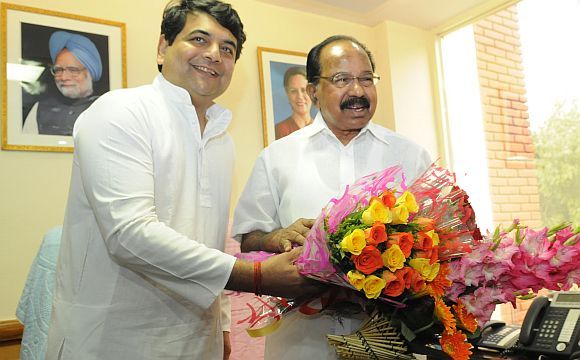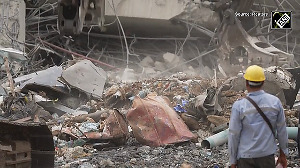'If the government starts playing favourites, if the government acts in a manner which is not transparent, then natural resources which belong to not just you and me, but future generations, they fritter away.'
'The anger against corruption, the anger against India's natural resources being looted is a consequence of the fact that within society there is a huge amount of turmoil and discontentment.'
'Why should an Empowered Group Of Ministers or the Cabinet Committee on Economic Affairs decide the administered price of gas?' asks Paranjoy Guha Thakurta in this exclusive interview with Rediff.com's Sheela Bhatt.
 If there is a serious national issue concerning the political economy or the environment worthy of our attention and needs to be explained without bias, you need to ask Paranjoy Guha Thakurta.
If there is a serious national issue concerning the political economy or the environment worthy of our attention and needs to be explained without bias, you need to ask Paranjoy Guha Thakurta.
The independent journalist and educator will work meticulously to get at the facts, figures and relevant information to educate the public.
His exposes are without hype and sensation, but carry conviction and substance. His work touches our collective consciousness.
In the final part of this enlightening interview with Rediff.com's Sheela Bhatt, Guha Thakurta discusses the Krishna-Godavari basin gas wars, and Reliance Industries Limited's role in the controversy.
Have you read the first part of the interview? 'By targeting Ambani, Kejriwal is trying to kill two birds with the same stone'
Do you think Mukesh Ambani is vulnerable because of former Delhi chief minister Arvind Kejriwal's campaign against Reliance Industries?
That's a very difficult question to answer. I think, Mr Mukesh Ambani, like all entrepreneurs, is seeking to maximise the profits of his company and maximise the returns he gives to his shareholders.
I think it is the Government of India in general, and the ministry of petroleum and natural gas in particular, which is supposed to protect the interests of the people of this country.
Everybody says -- they all agree -- the Supreme Court says so, the government says so, that these natural resources belong to the people of this country.
Who is the custodian of these resources? Who is supposed to be a fair, unbiased, custodian of these resources?
If the government starts playing favourites, if the government acts in a manner which is not transparent, then these natural resources which belong to not just you and me, but future generations, they fritter away.
Will Arvind Kejriwal be able to influence young Indians with his views on Mukesh Ambani?
It is a difficult question to answer. There will be a section of young people who want to be like Mukesh Ambani.
I think there are also a lot of young people who realise that our society is highly unequal.
There has been a huge gap between the rich and the poor, but I think the realisation has come, that in the last few years, this gap has widened.
We have become one of the most unequal countries in the world.
And one of the main reasons for it is the kind of food inflation we have seen over the last 6 or 7 years.
The government itself says the speed at which food prices have gone up, it's not only hurting the poor, it's also hurting the middle class.
It is bound to happen because the poor spend a larger proportion of their total income on food in comparison to the rich. Food inflation widens the gap between the rich and the poor.
I am not saying the rich have become richer and the poor have become poorer. I am saying the rich have become richer much faster than the poor have become richer or their real incomes -- when I say real incomes, I mean income adjusted for inflation -- so the gap between the rich and the poor has widened.
That in my opinion is one of the reasons why we see the kind of anger, the outrage in society.
The anger against corruption, the anger against India's natural resources being looted is a consequence of the fact that within society there is a huge amount of turmoil and discontentment.
Do you think Arvind Kejriwal will be able to convert the Gas Wars, the allotment and pricing of gas from the Krishna Godavari basin, into an election plank?
I am not so sure it will happen. The issue that will strike a chord in the minds of large numbers of people is the entire issue of natural resources.
How are natural resources allotted, how they are priced.
The issue that concerns a lot of people is whether the resources that are supposed to belong to them are being used for the benefit of society as a whole or is it benefitting only a few people.
This, to me, is the political issue that matters. People may not understand the complexities and intricacies of the production sharing contract or the details of the dispute between the government and Reliance.
But, mind you, the government is not a monolithic body.
Within the government there is also a body called the CAG (Comptroller and Auditor General).
Within the ministry of petroleum and natural gas itself, there have been honest, sincere, officials including people who have held the posts of director general of hydrocarbons, which is the regulatory body. They have acted in a conscientious manner.
But very often you found that their views have not prevailed, their views have been over-ruled, they have been transferred, removed or they have not been given importance.
Take the case of what happened even within the Cabinet.
The dissent of (then petroleum minister) S Jaipal Reddy?
Yes. Within the Cabinet itself, the ministers thought this is not the way the government should act.
What was Mukesh Ambani doing exactly?
Mukesh was able to defeat his younger brother (Anil Ambani) in the battle to control gas from the Krishna Godavari Basin. This was due to a judgment of the Supreme Court.
The judgment never said that this judgment was going to benefit Mukesh Ambani and would go against the interests of Anil Ambani.
This judgment was made in the name of the people of the country.
If you read the judgment, it will tell you how the natural resources of this country are supposed to belong to the people of this country and that the government has the last say.
Before this judgment came, people forget Anil Ambani openly attacked Mr Murli Deora, who was then the petroleum minister.
It is rare that an industrialist names and publicly attacks a Union minister!
That was how bitter the sibling rivalry had become.
So, with the rise of Dhirubhai Ambani and then the subsequent battle between his two sons, the nexus or the way the nexus between business and politics works underwent a transformation.
Will Reliance Industries get $8.4 per unit of gas in April?
This is a question the Supreme Court will decide soon. This question you should ask (Petroleum Minister M) Veerappa Moily, Dr (Chakravarti) Rangarajan and others who support higher -- almost doubling -- administered price of gas.
They argue that this is the best way that you can attract foreign investment!
Others who have opposed this move -- including the former principal adviser, energy, to the Planning Commission -- Dr Surya Sethi have argued that, 'No, this will not happen.'
Who helped Reliance the most?
I think the Government of India, headed by two petroleum ministers, Mr Murli Deora and now Mr Veerappa Moily.
I want to make two points. In this book (Gas Wars: Perspectives on Crony Capitalism -- Ambani brothers and the battle for India's resources, written by Paranjoy Guha Thakurta, Subir Ghosh and Jyotirmoy Chaudhuri) there are some new, some exclusive parts to the book.
It contains the last interview given by the former chairman and managing director of ONGC (the Oil and Natural Gas Corporation) which talks about how this battle between the (Ambani) brothers took shape. I am deliberately not naming him.
I have covered a former minister for petroleum and natural gas who, in a private speech made in front of large numbers of people, termed government's decision to increase the administered price of natural gas from $2.34 to $4.20 as something that he was opposed to.
He even sarcastically remarked that the figure 420 has a special connotation in India. I am deliberately not naming him.
Do you believe there is substance in the allegation that Reliance, because it was not getting a favourable price and because it knew that the government would increase the price at a much higher level, it purposefully went slow?
Reliance denies it ever did this. All the RIL spokespersons deny that it hoarded or squatted on gas reserves or that it deliberately reduced the output of gas from the KG basin because it wanted a higher price. They vehemently deny it.
But it is also correct that the directorate general of hydrocarbons has said that Reliance did not drill the number of wells it was supposed to drill. That could be another reason why the output of gas came down.
This is a very complicated and a tricky question. But there is a technical opinion, including the opinion of an independent expert -- P Gopalakrishna -- who thinks RIL, the contractor, produced less because it did not drill the number of wells it was originally supposed to.
Reliance has its own explanation. They said it was no use drilling the wells because the company was not going to get the gas in any case.
There are conflicting opinions and therefore it depends on which side you are on.
If you are on the side of Reliance, you will say, 'No, there is nothing abnormal. These are due to geological surprises, this is a high risk business, it's a casino business, it's a gamble. You don't know how much gas will come out until all the gas actually comes out.' This is one view.
The other view says you did not do what you were supposed to do, you did not drill enough wells.
What should be the ideal price of the gas?
There is no ideal price. There is no perfect price.
All I can say is that these prices vary over a period of time.
The Rangarajan committee's formula has been criticised on a number of grounds. One of the important points on which the Rangarajan committee's formula has been criticised is that it uses the price of gas in Japan as one of the variables.
The price of gas in Japan is one of the highest in the world. So why should we compare the price of gas and take the highest?
There was an entire presentation made by Dr Surya Sethi before the EGOM (Empowered Group of Ministers) headed by (then external affairs minister) Pranab Mukherjee. It showed how different countries across the world price their gas. He (Dr Sethi) pointed out that India should follow the best practices across the globe, but we did not.
Why should an Empowered Group Of Ministers or the Cabinet Committee on Economic Affairs decide the administered price of gas?
Was Dr Rangarajan an energy expert?
Did his committee take into view the ministry of power and the ministry of fertilisers?
Can we say something went wrong in the decisions taken and the processes adopted by the EGOM committee?
Absolutely. The book points out how those decisions were taken in an arbitrary manner.
Isn't Pranab Mukerjee also responsible in some way with the pricing of Reliance Gas?
The Rashtrapati of India (Pranab Mukherjee) has on more than one occasion acknowledged his proximity to the late Dhirubhai Ambani and the fact that he has known the family very well for many years.
He also expressed his disappointment that the (Ambani) brothers were fighting each other. So the Rashtrapati's closeness to the Ambani family is hardly a secret.
The Empowered Group Of Ministers, which worked under his leadership when he was external affairs minister, in my opinion, should have operated in a far more transparent manner. They should have taken into account a wider range of views from different experts, including Dr Surya Sethi.
Just as the Rangarajan Committee should have given more attention, I think, to the strong views of the ministry of power and the ministry of fertilisers.
How much has Mukesh Ambani's company earned from the Krishna Godavari basin so far?
There are various estimates that have been put out by various people and various guesstimates that have been put out, including how the profits of the company would go up if the price of gas is doubled from 4.2 dollars per unit to 8.4 dollars a unit.
All I can say is that India's largest privately controlled corporate entity does not in its books of accounts, in its balance sheet, separately provide how much it earns from its gas business and how much profit is earned.
These accounts are consolidated. And therefore it is very difficult for me to give any figure.
So what is your estimate? What is the loss that may have been incurred?
I cannot give you a figure because I don't know the figure. All I know is it is a huge amount of money.
How do you calculate the cost of a power plant which instead of working at 100% capacity is working at 20% capacity because gas is not made available?
How do you calculate the cost to the nation or the cost to the exchequer of a fertiliser plant which is operating at 25% of its capacity?
These are all notional figures, but the figures are huge, they run into billions of dollars.
Image: Petroleum Minister M Veerappa Moily, right, who is one of the two Union ministers Paranjoy Guha Thakurta says helped Reliance.







 © 2025
© 2025